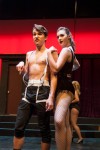HOOLIGAN Theatre Company is trying to push boundaries this quarter with risqué costumes and social commentary in its production of “Cabaret.”
In addition to a heavy amount of dancing, the show deals with themes of violence and genocide in 1930s Germany.
“Cabaret,” which runs Friday and Saturday at Schoenberg Hall, tells the fictional story of the American writer Clifford Bradshaw who moves to Germany prior to World War II and becomes involved with Sally Bowles, a dancer at the Kit Kat Klub. As the Nazi party rises to power, Berlin society divides around the issue of how to respond to the new regime.
Throughout the show, the character Emcee, the master of ceremonies at the Kit Kat nightclub, narrates and provides insight into what is happening onstage while interacting with the audience. Executive producer Amanda Faucher, a fourth-year communications student, said despite being set during the rise of Hitler, the show is still socially relevant and conveys a message that can resonate with anyone, regardless of their political attitudes.
The decision to stage “Cabaret” was inspired by the 2016 presidential election, and the protests against white supremacists and neo-Nazis at the University of Virginia, Faucher said. She added she thinks “Cabaret” can inspire audiences to make a positive difference in the current political and social climate.
“We want to inspire audiences to look at the world around them and say, ‘I want to make a change,’” Faucher said.
Christian Giannini, a third-year communications student who plays Emcee in the production, said the casting team chose actors who were comfortable portraying difficult subject matter, such as anti-Semitism, so HOOLIGAN could meaningfully explore the play’s socially relevant themes.
“I feel like a lot of people go to the theater to escape problems and go into a different world, whereas ‘Cabaret’ forces you to face certain things and become aware,” Giannini said.
Giannini said HOOLIGAN’s directors and producers did not put any content restrictions on the musical. When he played Emcee in his high school’s 2014 rendition of “Cabaret,” the director made the show suitable for younger audiences by toning down parts that featured violence or sexually explicit content. Giannini said HOOLIGAN’s version stages the show as it is intended to be performed by including all of its adult-oriented content.
The show’s adult themes begin in the opening number “Willkommen,” in which the gender-bending master of ceremonies welcomes the audience to the cabaret, backed by shirtless dancing men and women in black lingerie and fishnets. Similarly, in the song “Don’t Tell Mama,” a singer talks about hiding that she’s a dancer at a seedy strip club from her mother.
Faucher said the extravagant dance numbers and risqué costumes help engage the audience and contrast with the dark, political themes represented in other scenes. While the characters dance in black lingerie in some scenes, other scenes feature somber portrayals of violence and genocide.
Executive producer Kiara Bryant, a third-year communications student, said the contrast between moods makes the serious moments more impactful.
“You’re enjoying all the dance numbers and the comedy … but then you’re faced with some of the harsher realities that were present in 1930s Berlin,” Bryant said. “It kind of makes you realize ‘I’m out here having fun while … serious things are happening.’”
Faucher said modern audiences can also relate to the story because it focuses on complex, universal human emotions. Audiences can recognize aspects of their world – such as people with contrasting political attitudes – onstage, she said.
“You can have … well-intentioned people who don’t think they’re able to make a change, you have the people who say … ‘I’m stopping this,’ and then you have the people who say ‘I don’t see a problem,'” Faucher said. “We want to bring awareness … that people all across that spectrum do exist and you’re probably one of them.”
Marlena Becker, a third-year theater student, said each lead character represents a distinct political attitude. Her character, Sally Bowles, doesn’t care about the destruction and discrimination in the world around her because she is young and selfish. On the other hand, a German woman named Fraulein Schneider is aware of the political instability around her and consequently terminates her relationship with a Jewish man named Herr Schultz to avoid political and social consequences, Becker said.
“I definitely think (groups with different political ideologies) emerged in the last election,” Becker said. “There were the people who didn’t care, didn’t vote, which is such a problem in our nation. … Hopefully when the audience watches, they’ll see what can happen when you don’t care.”
To further engage the audience, Giannini’s character often breaks the fourth wall and interacts directly with the people in the theater. When his character deals with serious issues, the audience goes through the same emotions alongside him. He said he thinks “Cabaret” presents history more powerfully than a textbook because it explicitly portrays the period’s disturbing themes.
“I think it touches upon the importance of acceptance, tolerance (and) educating yourself, regardless of whatever issue is happening, especially in today’s political climate,” Giannini said.
